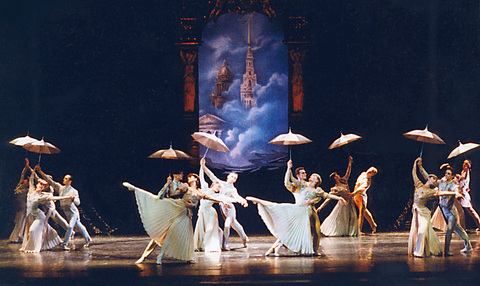Next week the Eifman Ballet of St. Petersburg (
The 59-year old is a rarity in the world of Russian dance. A graduate of the Leningrad Conservatory's choreography department, in 1970 he became the official choreographer of the Vaganova Academy, the school attached to the world-famous Kirov Ballet.
Many people would have been content with that position and the opportunities it afforded to create pieces for the school, other companies and television shows. But Eifman wanted more than the stultifying world of Soviet government-sanctioned ballet could offer. After all, this is a man who says that he knew at the age of 13 that he wanted to be a choreographer.

PHOTO COURTESY OF ARTISTS
He battled the bureaucracy for several years until he was finally given permission to form his own dance troupe, the Leningrad New Ballet company. Not only was it not part of the state-funded theater system, relying in part on private donations and what it could earn, it focused on modern choreography.
Over the years, the company's dancers honed their modern ballet technique as Eifman created dozens of pieces for the troupe, which gained a reputation for breathing new life into the world of Russian dance. The company became the St. Petersburg State Academic Theater of Ballet before changing its name once again to the Eifman Ballet of St. Petersburg.
Starting in 1993, Eifman began to create full-length works that combined Russian history with modern story lines and dance. He is more than just the choreographer and artistic director of the company. He often writes the librettos -- with an emphasis on psychological extremes -- puts together the music, does the staging and often the lighting.
The company is bringing two of Eifman's full-length ballets to Taipei -- Tchaikovsky: The Mystery of Life and Death (next Wednesday, Thursday and Friday nights) and Russian Hamlet: The Son of Catherine the Great (Saturday evening and Sunday matinee).
Tchaikovsky, which premiered in 1993, was the first of Eifman's full-length ballets. It is set, naturally, to the music of Piotr Ilyitch Tchaikovsky, the composer who is so closely entwined with the great classics of Russian ballet.
In Russian Hamlet, which premiered in 1999, Eifman has taken the story of Catherine the Great of Russia and her son Paul and linked it with that of Hamlet and his mother Gertrude, set to the music of Ludwig von Beethoven and Gustav Mahler.
Eifman's action-packed choreography, at least among Western critics, has a reputation for being sometimes less than inspired and too often repetitive and predictable -- charges his Russian fans vigorously condemn. The company, however, has a reputation for technical proficiency and its dancers are certainly among the best in Russia.
All in all, the company is a fitting climax to the National Theater and Concert Hall's Passion of the North series.
Performance notes:
What: The Eifman Ballet of St. Petersburg
Where: National Theater of the CKS Memorial Hall, 21-1, Zhongshan S Rd, Taipei City (
When: Wed, Dec. 7 through Sun, Dec. 11; all performances at 7:30pm, except for the Sunday matinee at 2:30pm
Tickets: NT$600, NT$800, NT$1600, NT$2400, NT$3200, NT$4000 and NT$4800, available through the NTCH box office or ERA ticketing

In the March 9 edition of the Taipei Times a piece by Ninon Godefroy ran with the headine “The quiet, gentle rhythm of Taiwan.” It started with the line “Taiwan is a small, humble place. There is no Eiffel Tower, no pyramids — no singular attraction that draws the world’s attention.” I laughed out loud at that. This was out of no disrespect for the author or the piece, which made some interesting analogies and good points about how both Din Tai Fung’s and Taiwan Semiconductor Manufacturing Co’s (TSMC, 台積電) meticulous attention to detail and quality are not quite up to

April 21 to April 27 Hsieh Er’s (謝娥) political fortunes were rising fast after she got out of jail and joined the Chinese Nationalist Party (KMT) in December 1945. Not only did she hold key positions in various committees, she was elected the only woman on the Taipei City Council and headed to Nanjing in 1946 as the sole Taiwanese female representative to the National Constituent Assembly. With the support of first lady Soong May-ling (宋美齡), she started the Taipei Women’s Association and Taiwan Provincial Women’s Association, where she

Chinese Nationalist Party (KMT) Chairman Eric Chu (朱立倫) hatched a bold plan to charge forward and seize the initiative when he held a protest in front of the Taipei City Prosecutors’ Office. Though risky, because illegal, its success would help tackle at least six problems facing both himself and the KMT. What he did not see coming was Taipei Mayor Chiang Wan-an (將萬安) tripping him up out of the gate. In spite of Chu being the most consequential and successful KMT chairman since the early 2010s — arguably saving the party from financial ruin and restoring its electoral viability —

It is one of the more remarkable facts of Taiwan history that it was never occupied or claimed by any of the numerous kingdoms of southern China — Han or otherwise — that lay just across the water from it. None of their brilliant ministers ever discovered that Taiwan was a “core interest” of the state whose annexation was “inevitable.” As Paul Kua notes in an excellent monograph laying out how the Portuguese gave Taiwan the name “Formosa,” the first Europeans to express an interest in occupying Taiwan were the Spanish. Tonio Andrade in his seminal work, How Taiwan Became Chinese,